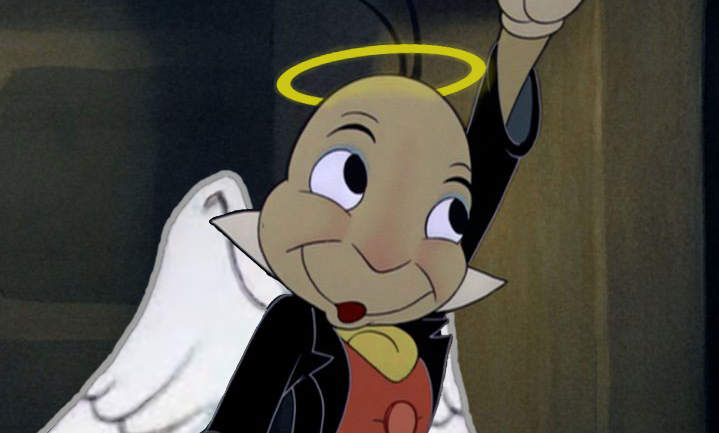I dub you Pinocchio’s conscience, Lord High Keeper of the Knowledge of Right and Wrong, Counselor in Moments of High Temptation, and Guide Along the Straight and Narrow Path. Arise, Sir Jiminy Cricket. -Blue Fairy
Pinocchio dreams of becoming a real boy, and to do so he must be “brave, true, and unselfish,” just as the Blue Fairy says. But because Pinocchio doesn’t know right from wrong yet, the Fairy commissions Jiminy Cricket to act as Pinocchio’s conscience. So begins Disney’s animated tale of Pinocchio.
In this world, humans seek to become “real,” too: by becoming saints in heaven, since saints are more truly human than those still seeking perfection. To become a saint, a person, by the grace of God, must be brave, true, and unselfish, just as the Blue Fairy—and Scripture—say. For man’s journey, God grants something much greater than an insect attendant, however: over each soul He places its own guardian angel “to light and guard, to rule and guide.” Just as Pinocchio uses an animated cricket to characterize one’s conscience, so too have the guardian angels received their own cartoonish depictions. While the angel-on-the-shoulder caricature fails to display the angels’ true majesty, this depiction does demonstrate two important characteristics of angels. It shows both their ministerial role and the hostility that exists between these conscientious companions and their conniving counterparts.
The image is standard: on opposing shoulders stand diminutive angels, one with a halo and the other with horns, while the person between determines whose advice he should follow. Conscience is a judgment of a person’s reason deciding between two perceived goods. To choose rightly, moral conscience must be developed through prudent discernment and self-examination. To aid mankind, God has commissioned his angels not only to keep us out of trouble, but also to help us make swifter progress toward sanctity. Angels suggest the right path by imparting ideas, thoughts, and images that inspire us toward the best good in each situation (ST I, 111, 1). Each person determines whether to cooperate with his or her angel’s efforts to enlighten and direct them, or to ignore and reject them, preferring the ways of sin. The human experience of the latter is so common that Jiminy can define conscience as “that still small voice that people won’t listen to,” and all the adults will smile wryly. But consistently listening to and assenting to that small voice will yield even wider smiles. That’s because man is called to pursue the best path and to build up good habits, called virtues, even in the face of temptation. But the struggle is real, as Jiminy’s confusing explanation of temptation reveals:
Yep, temptations. They’re the wrong things that seem right at the time… but… uh… even though the right things may seem wrong sometimes, or sometimes the wrong things… may be right at the wrong time, or visa versa.
The source of these temptations is that figure resting unwelcome upon the opposite shoulder. These demons, fallen angels, are usually depicted haunting our left shoulders (in Latin, the word for left is “sinister”), seeking to wile us away from making the right decision by empty promises and vain pursuits. Against these malicious and murderous mutterings we have seen it best to invoke the protection of the angels. St. Raphael advised Tobias on how to ward off a demon (Tob 6:6-7). “The angel of the Lord encamps around those who fear him, and delivers them,” the Psalmist assures us (Ps 34:7). Leading the celestial counteroffensive, St. Michael and his angels wage war against the Beast and his followers (Rev 12:7-9). It should be clear that angels are no plush, dollish figures: they are numinous, celestial beings possessing the very power of God to cast down demons and scatter the darkness of ignorance and sorrow.
In times of trial and travail, it is helpful to have our armory of prayers handy and the celestial barracks on speed-dial. Like Jiminy Cricket reproving the remonstrable influence of Lampwick, the angels can help conquer any temptation or fear.
Along with the angels, intercession and inspiration may come from the Seraphic Virgin St. Catherine of Siena or our Seraphic Father St. Francis of Assisi (so named for the fiery charity of the Seraphim, the highest of the nine choirs of angels). St. Thomas Aquinas, “the Angelic Doctor,” is an especially powerful intercessor with regard to purity (see the Angelic Warfare Confraternity). Above all the saints reigns the Virgin Mary, Queen of the Angels, who can send forth the whole heavenly host to aid any soul in need.
Jiminy Cricket’s dedicated service helped Pinocchio to become a real boy. So, too, through the heavenly guidance of the angels and earthly perseverance in virtue, can man achieve his end of perfect beatitude, beholding the face of God. “Remember, always let your conscience”—and your guardian angel!—“be your guide!”
✠
Image by Ignatius Weiss, O.P.







